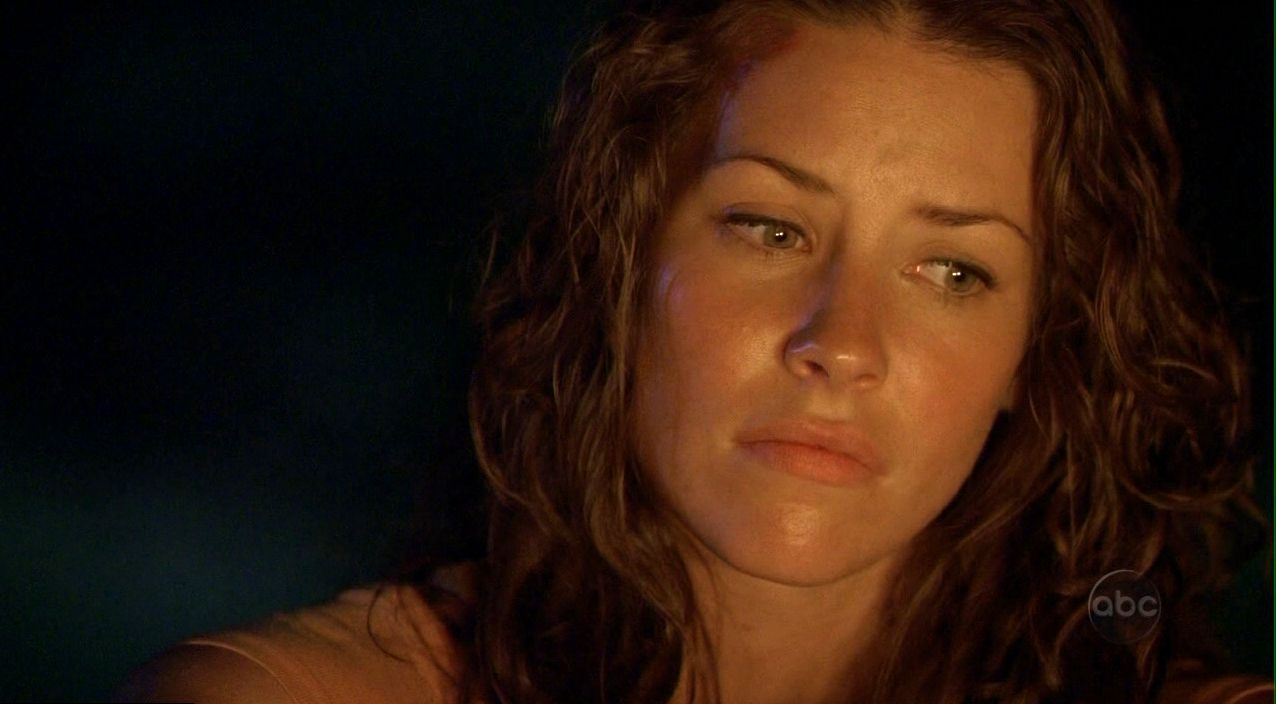 Now we move on to the third episode of the series, "Tabula Rasa," in which some of Kate's backstory is revealed.
Now we move on to the third episode of the series, "Tabula Rasa," in which some of Kate's backstory is revealed.We start off with the first ever "Previously on Lost" showing clips from the first two episodes. One of those scenes is the backgammon scene between Walt and Locke...there is absolutely no way that is not important.
We start off among the fuselage with the survivors. People are sorting through the clothes, led by Claire. Meanwhile, Jack is tending to Edward Mars, our favorite marshal, who is trying to warn Jack that "she's dangerous." He repeats that he has to "find her" and "bring her back." The marshal mentions his handcuffs (the ones that Walt found in the jungle), and then forcefully tells Jack to check his jacket pocket. He's not doing very well, and Jack mentions that he has a high fever and frequently passes out. Jack checks the marshal's pocket, and finds Kate's mugshot. Jack is very shocked, obviously.
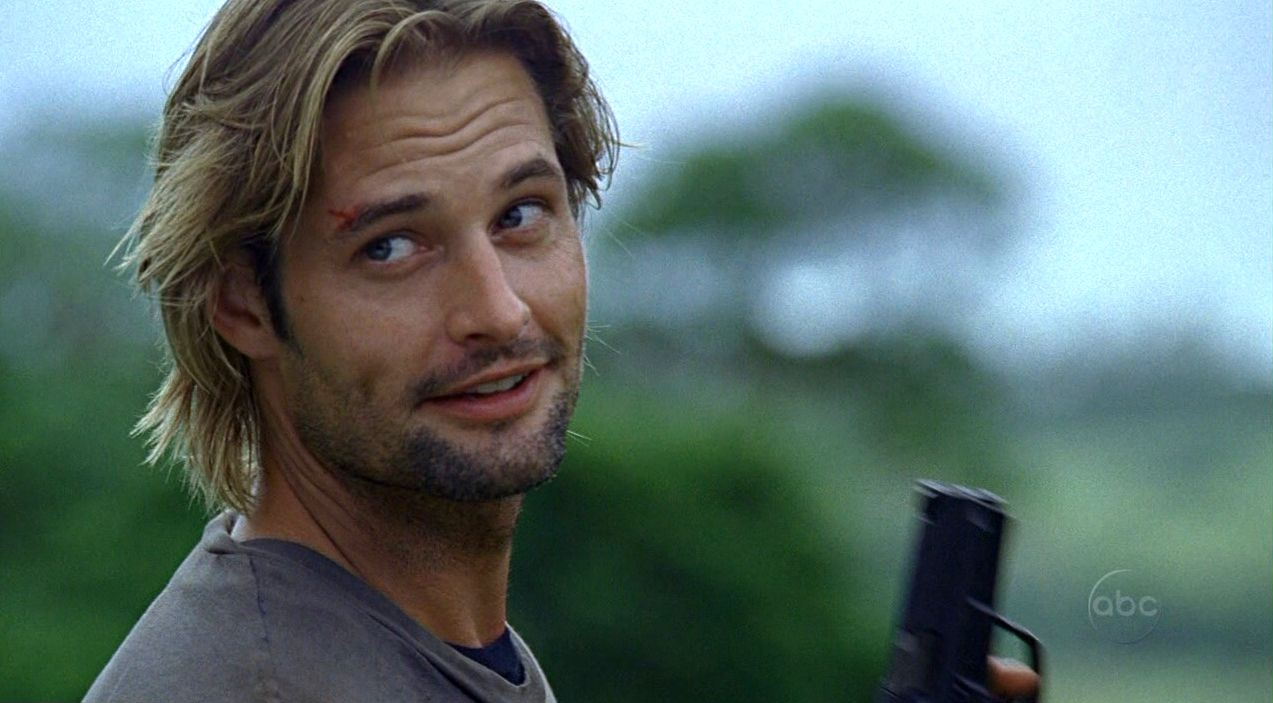 Meanwhile, Kate and the rest of her group are journeying back from the high ground they went to check the transceiver on. In a funny moment, Boone calls Sawyer a "hick," and Sawyer notices. Sayid states that they should make camp. Sawyer tells the rest that he is going to continue on the on, but Sayid tells him that whatever is knocking down the trees will get him. Kate convinces Sawyer to stay with them.
Meanwhile, Kate and the rest of her group are journeying back from the high ground they went to check the transceiver on. In a funny moment, Boone calls Sawyer a "hick," and Sawyer notices. Sayid states that they should make camp. Sawyer tells the rest that he is going to continue on the on, but Sayid tells him that whatever is knocking down the trees will get him. Kate convinces Sawyer to stay with them.Meanwhile, Sayid tries to determine where they are using a rock and a torch. Kate tells them (in a line that will be repeated in every clip show ever) "The pilot said we were a thousand miles off course." Sawyer changes the subject to talk about Rousseau's transmission, and then he asks Kate how long the transmission was on a loop for, calling her "Freckles." That's a nickname that will probably be Sawyer's most oft-used. Kate obviously doesn't like the nickname now, but she will come to. Boone wants to tell the rest about the transmission, but Sayid says not to, in order to avoid a panic. "So we lie?" Kate asks. It's very reminiscent (in retrospect) to discussion that the Oceanic 6 told once off the Island in the episode titled (believe it or not) "The Lie."
Hurley, meanwhile, asks Jack if the monster was a dinosaur (which was actually a popular fan theory back in season one). Jack admits that if it antibiotics don't work, the marshal will die. Hurley notices Kate's mugshot. Hurley thinks she looks pretty hardcore, but Jack doesn't care what Kate did -- it's "none of his business."
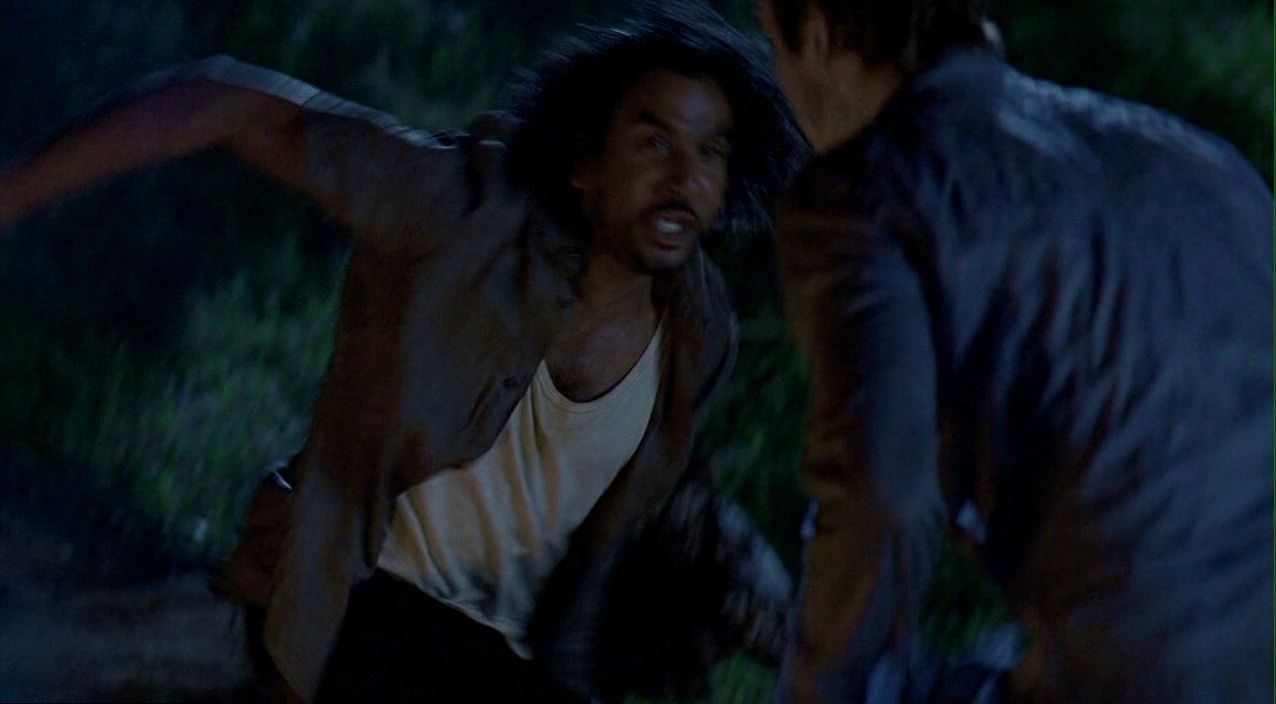 After the Lost intertitle, we go back and join Sayid's group. He's sleeping next to Shannon, which is interesting because before long, he'll be sleeping with Shannon. Boone steals the gun and the clip, saying he's going to stand guard. Sayid demands it back, but Sawyer doesn't think that "Al-Jazeera" will protect them (to which Charlie humorously replies that "Al-Jazeera's a network"). Shannon suggests that they should give the gun to Kate, which is ironic because she's the fugitive from justice. Everyone agrees, and Boone gives the gun to Kate.
After the Lost intertitle, we go back and join Sayid's group. He's sleeping next to Shannon, which is interesting because before long, he'll be sleeping with Shannon. Boone steals the gun and the clip, saying he's going to stand guard. Sayid demands it back, but Sawyer doesn't think that "Al-Jazeera" will protect them (to which Charlie humorously replies that "Al-Jazeera's a network"). Shannon suggests that they should give the gun to Kate, which is ironic because she's the fugitive from justice. Everyone agrees, and Boone gives the gun to Kate.And then we get the first "whoosh" flashback, and also the first pre-Oceanic flashback. It opens with Kate having a gun pointed at her by Ray Mullen, who has caught her sleeping in his sheep pen. Kate tells Ray that her name is "Annie," a name that is most famously held by Ben's childhood friend. Ray offers "Annie" some food. While she eats, she tells him that she ran out of money. She identifies herself as a Canadian (something that she is not, but Evangeline Lilly is). Ray tells her his wife died eight months before (one of the many number references throughout this episode), and he offers her a job in exchange for a fair wage and a place to stay. She goes to shake his hand, but his right arm is actually a prosthetic (not unlike a certain DHARMA scientist we know).
Back on the Island, Hurley runs to inform Jack of Sayid's group's return. The marshal, however, is not doing good. Sayid explains to the gathered survivors that though the transceiver tailed to pick up a signal, with the help of the survivors electronics, they could possibly boost the signal and try again. Locke, meanwhile, looks on. He doesn't like what Sayid wants to do, not one bit. Sayid actually begins to take a leadership position within the survivors, organizing groups for food, electronics, and water. Kate goes up to Jack and privately tells him about the transmission they heard. Kate asks about the marshal, and asks if he said anything. Jack lies and tells her that he didn't.
Jack talks to Hurley about Kate, and tells him that he won't confront Kate about the mugshot. However, the marshal is deteriorating fast, so he needs some more medication for him. Hurley won't go inside the plane because it's full of bodies, so Jack has to go inside. Once inside, he hears Sawyer inside, looting. Sawyer mentions Jack's need to fix things, telling him he's not "looking at the big picture." Sawyer says that Jack's still in civilization, while Sawyer's in the wild.
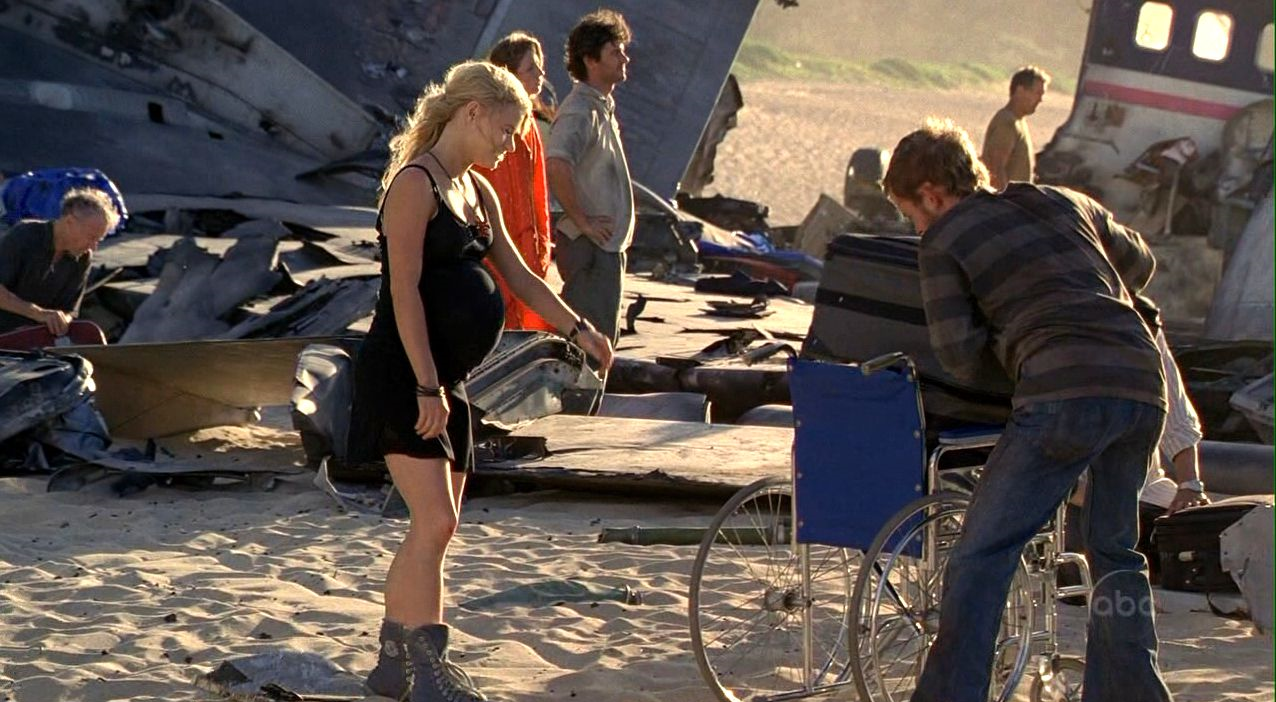 Charlie helps Claire with her bag, and puts it in the wheelchair he's found. This short scene is important for two reasons. Firstly, it sets up the Charlie/Claire romance that will continue up until Charlie's death in "Through the Looking Glass." Secondly, it introduces the wheelchair. Charlie says that the former owner of the wheelchair was probably "better off than they are," though the wheelchair actually belonged to Locke.
Charlie helps Claire with her bag, and puts it in the wheelchair he's found. This short scene is important for two reasons. Firstly, it sets up the Charlie/Claire romance that will continue up until Charlie's death in "Through the Looking Glass." Secondly, it introduces the wheelchair. Charlie says that the former owner of the wheelchair was probably "better off than they are," though the wheelchair actually belonged to Locke.Meanwhile, Sun thinks she's found Jin's bag, but he tells her that the one she was holding wasn't his. Jin tells her that's she's filthy, and that she should go wash up instead of continuing to look for his bag. Before she leaves, however, he tells her that he loves her, the first tender moment we've seen from Jin on the show. Charlie asks Claire if her husband was on the flight, but she tells him that she's not married. The father of her baby was actually Thomas, the painter who left her after he found out that she was pregnant.
Hurley, meanwhile, leaves the tent where the marshal is kept and runs into Kate. She introduces herself, and he's obviously nervous around her.
Later, Kate approaches the marshal while he sleeps. As she looks over him, we have a flashback. She's in Ray Mullen's pantry. Removing a back panel, she takes out her savings. This isn't the only time we'll see valuables kept in a pantry -- director Howard Zukerman, who Nikki and Paulo killed, kept his diamonds in a vault hidden in his pantry. Ray catches Kate, and it's revealed that she's not stealing; its her wages she's taking out. Kate tells him that she's got trust issues. She prepares to leave, but Ray offers to drive her to the train station in the morning. Ray tells her that he gets it, everyone deserves a fresh start. And that's where the name of the episode, "Tabula Rasa," comes from: the philosopher John Locke's idea that everyone deserved a blank slate, or Tabula Rasa.
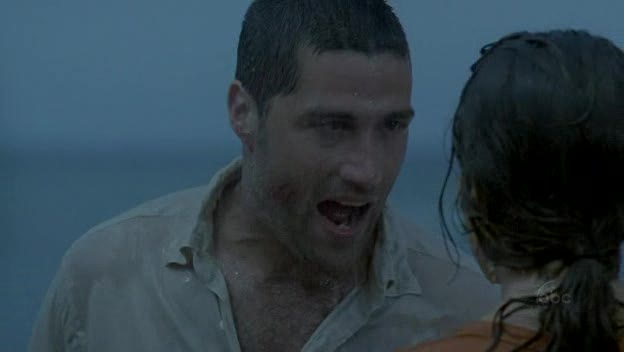 Back on the Island, Kate looks over the marshal while he's sleeping. He suddenly wakes up and starts choking her. Jack intervenes and pulls the marshal off. Jack realizes that the marshal's body is shutting down. Jack mentions that the marshal will suffer. Jack mentions that he saw Kate's mugshot -- and he is not going to kill the marshal, because he's not a murderer.
Back on the Island, Kate looks over the marshal while he's sleeping. He suddenly wakes up and starts choking her. Jack intervenes and pulls the marshal off. Jack realizes that the marshal's body is shutting down. Jack mentions that the marshal will suffer. Jack mentions that he saw Kate's mugshot -- and he is not going to kill the marshal, because he's not a murderer.There's another Kate flashback, which opens with a Patsy Cline song, a recurring feature that will almost become a staple of Kate-centric episodes. When she sees the marshal in the rearview mirror, Kate realizes that Ray intends to turn her in. Ray mentions that the reward for turning her in was $23,000 (another instance of the numbers), and he has a "hell of a mortgage." The marshal pulls up beside them and the flashback ends.
Meanwhile, Michael questions Walt about Locke, something that will eventually cause great tension between Michael, Walt, and Locke. Walt mentions that Locke told him a secret (about his paralysis) and Michael demands to know. Walt tells Michael that a miracle happened to Locke, but Michael writes this off as surviving the plane crash. Michael tells Walt that he shouldn't hang around Locke anymore. Michael promises to get Vincent as soon as it stops raining...and then it suddenly stops raining as Walt looks outside angrily. This is only the tip of the iceberg, but you can already tell that Walt has some sort of ability. Michael goes out looking for Vincent, but he doesn't hear Vincent...he hears a rustling and a roaring instead. He runs...right into a topless Sun, who is bathing. Michael tells Sun that something was chasing him, but she appears not to understand him, even though she really does. He then walks away, repeating that he didn't see anything.
The marshal's not doing too well, and his moans echo down the beach, where Locke is carving something. Charlie approaches, asking Locke what he's making. It's a whistle -- a dog whistle for Vincent. Charlie tells Locke that he's in a band, but Locke doesn't seem to care. Shannon, meanwhile, wishes that the marshal would just "die already." Sayid offers to help Jack, and informs him that the survivors are getting uneasy.
Kate tries to build a fire later on that night, and Sawyer comes up to offer her a light. Sawyer has come by to thank her for taking the gun away, because he wouldn't want to be the one with the gun, because he knows that the marshal has to be euthanized. The only one that can do it is the one with the gun. The marshal tells Jack not to trust Kate, because she will do anything to get away. The marshal won't tell Jack what she did, but he wants to talk to Kate alone.
The flashback continues, and the marshal once again gets behind them to avoid a car. As he comes back around, Kate jerks the wheel from Ray's hand, flipping the truck and getting it off the road. The truch catches on fire, and she drags Ray to safety, inadvertently yanking of his prosthesis as well. She is suddenly caught by the marshal.
After the flashback, the marshal asks what the favor was that Kate wanted. She remembers the favor that she asked the marshal before the plane crash, and then tells him that she wanted him to make sure that Ray Mullen got his $23,000. The marshal tells her that she really is one of a kind, and that she would have gotten away if she hadn't saved him. She thinks she's gotten away, and she tells the marshal that he's gonna die. The marshal asks if she's going to euthanize him, or what.
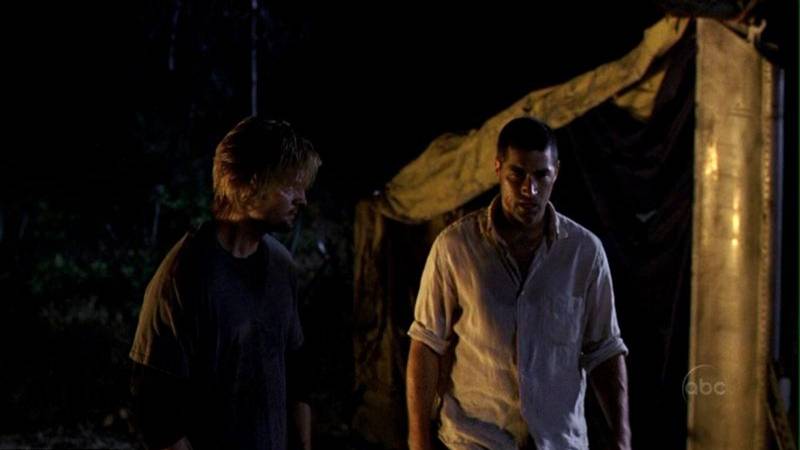 Meanwhile, Jack is outside, talking with Hurley. Hurley mentions that Kate has the gun. Jack rushes to the tent, but sees her walking out. The gun fires anyway, and Sawyer exits the the tent, holding the gun. Then they realize that Sawyer didn't kill the marshal -- as a matter of fact, he missed his heart and hit the marshal's lung. Ashamedly, Sawyer leaves. Shaken, he pulls out a cigarette, but it won't light. Inside, Jack makes the moaning stop -- he's finally euthanized the marshal.
Meanwhile, Jack is outside, talking with Hurley. Hurley mentions that Kate has the gun. Jack rushes to the tent, but sees her walking out. The gun fires anyway, and Sawyer exits the the tent, holding the gun. Then they realize that Sawyer didn't kill the marshal -- as a matter of fact, he missed his heart and hit the marshal's lung. Ashamedly, Sawyer leaves. Shaken, he pulls out a cigarette, but it won't light. Inside, Jack makes the moaning stop -- he's finally euthanized the marshal.The next morning, Locke blows his whistle while sitting on the beach. Vincent suddenly emerges from the jungel, running toward Locke. Locke goes to get Michael, and tells him that he's found Vincent, and suggests that Michael bring Vincent back to Walt. Michael thanks Locke, and they're okay...for now.
Kate comes and sits next to Jack on the beach, offering to tell him what her crime was. he doesn't want to know, however, and we won't find out that she blew up her father's house until the season two episode "What Kate Did." Jack mentions that three days ago they "all died," the quote that spawned a thousand theories that they were all in purgatory. Jack offers her a fresh start, and they sit alone on the beach in silence, while Hurley listens to his CD player, Joe Purdy's "Wash Away." The episode ends in a montage of happiness, with Jin stroking Sun's hair, Boone finding Shannon some sunglasses, Sayid tossing Sawyer an apple (making amends with him for their previous fight), and Charlie taping up his fingers (but changing the "F" in "Fate" to an "L") while C
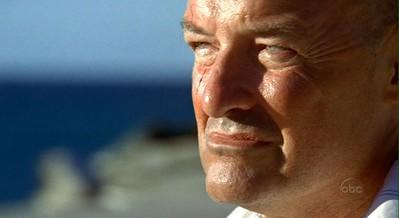 laire sits down the beach. Michael also brings Vincent to Walt, who happily runs to meet his dog. Locke watches from afar, and he's got the enigmatic expression that could only indicate that next week, he's going to have a flashback.
laire sits down the beach. Michael also brings Vincent to Walt, who happily runs to meet his dog. Locke watches from afar, and he's got the enigmatic expression that could only indicate that next week, he's going to have a flashback.You can discuss "Tabula Rasa" in this forum thread. You can find others' reviews of this episode at the Lostpedia hub. Look for my review of "Walkabout" on Saturday.
One thing I noticed after my TR rewatch and I'm curious about is in the Locke closeup shot at the end of the episode, specifically in the background sounds - first, the theme is pretty darkish, and second, more interesting, there is a weird sound right before the fade to black screen which sound to me like a smokey-like noise. Can anyone confirm this?
ReplyDeleteThis comment has been removed by the author.
ReplyDeleteIt was also interesting how Sawyer said that Al-Jazeera won't protect them. "Al-jazeera" is actually Arabic for "the island."
ReplyDeleteDunno about any Smokey noises, but made the same observation on my modest little blog about John at the end of the episode: "Such an ominous fade out on Locke after his good turn for Micheal!" I'll listen again tonight and let you know what I hear...
ReplyDelete"I am not a murderer" . Quality acting Matthew. I think the locke fade out was to get the audience to view him as suspicious again after he got vincent back for walt.
ReplyDeleteJust listened to the last minute with the headphones on - yup, just at the fade, after 'Wash Away' melts into the hollow echo effect - there's a very faint clickity click - the NYC Yellow Cab meter sound.
ReplyDelete@TMGL - funny you mention the NYC cab sound. That's what I always think it sounds like, too. :} Supposedly they taped a grocery store register cashing out and played with the audio, and that's the actual sound.
ReplyDeleteSorry to jump ahead, but listen for the smokey sound in Walkabout, when John is sitting as his desk working on reports- right after his boss gives him grief about getting his reports in on time. Never would have noticed the smokey sound back when I first watched it, now it stands out so much. :}
The word destiny keeps coming up in these first few episodes, too - another thing I didn't even notice when I re-watched them last year.
@LolaG, you are absolutely right about Locke's adding machine at the box company.
ReplyDeleteDamon and Carlton owned up to the NYC Cab as the source a couple years back:
http://lostpedia.wikia.com/wiki/Official_Lost_Podcast_transcript/May_21,_2007
The sound is also alluded to in the Pilot episode when Rose says that it sounded familiar to her. "Oh yeah? Where you from?" "The Bronx", she replies.
I'm noticing a lot about destiny, too - and lots of mentions or "I'm supposed too" and the like. Makes sense in light of the long con that we now know is being played out here.
The philosopher John Locke's theory "Tabula Rasa" was not about everyone deserving a clean slate, but that individuals are born without built-in mental content (a clean slate)and that their knowledge comes from experience and perception.
ReplyDeletehttp://en.wikipedia.org/wiki/Tabula_rasa
I was just rewatching first five episodes yesterday and now I see you, Lostpedia guys got the same idea, cool. :D
ReplyDeleteI've noticed one thing in this episode - Ray's arm issue. We all remember dr.Chang who has lost his hand in the "Incident" and also Montand from Rousseau's team who has lost his arm because of the Smoke Monster. I wonder if there is any connection between them or is this just coincidence (like Ben's and Locke's mothers name - Emily).
The other thing I liked in this episode was the song and happy ending, especially Sayid tossing Sawyer an apple. Why in the latest seasons there were so little happy moments and no peaceful endings like this one?...
And about Tabula Rasa meaning - I think in the show it was simplified. Of course in the philosophy there isn't anything about getting a new start or life but the key words are "tabula rasa", clean state. In the philosphy people are meant to be born with it and in the show they just used this phrase to present the opportunity to start a completely new life on the island. That's why Jack didn't want later Kate to tell him what she did - it doesn't matter because on the island they received a completly new beginning with the clean state.
I hope you understand what I mean and that I didn't make too many mistakes. English isn't my native language (but I learn it in school for about nine years now). :)
Not only does destiny start popping up alot but the word choice will too.
ReplyDeleteI had aleady rewatched all of season 1 before you guys started this project. Choice and destiny is used quite a bit.
I think the very end will come down to choice or destiny.
Something I have been noticing more and more, which goes back to the theory that the Nemesis and Jakob are playing a game with everyone and trying to best each other, is it almost seems like Locke is so much the key component to the game that is seems much more on purpose than coincidence. Almost like season 5 wasnt the only time Lock/Flocke was channeled.
ReplyDeleteThe one very big thing that supports this in my mind is that the Locke before the island is nothing at all like the Locke on the island, and its incredibly visible right from the beginning. Two completely different mindsets. No transition, which you would think would be natural.
Simply, there is just so much more to Locke I think the rewatch proves and we will learn in Season 6.
The contrast between off-island Locke and on-island Locke is so stark pre-Jacobs-Enemy-takeover, that when I saw the 'resurrected' Locke, it kept going through my head that he actually needed the island more than it needed him.
ReplyDeleteNow we know why the change, but I didn't question who it was initially, cuz it seemed to follow what we had seen before.
All the off-island scenes show him as completely lacking any of the confidence he pretty much exudes once he's on the island and on his feet.
He can't make a convincing case to ANY of the Oceanic 6, doesn't even have the ability to begin with a persuasive argument - it's just pathetic old John blurting out "You have to go back" like some freaking street crazy.
This is probably more pertinent to the 'Walkabout' episode, but it does appear that maybe all he needs is a little push...
I watched a foreign film, Seventh Seal (Swedish 1957, Bergman), last night on TCM. I immediately saw a number of similarities with LOST. As I rewatch the LOST episodes, I probably will spot more similarities.
ReplyDeleteComparison of Film Seventh Seal (Swedish 1957, Bergman) and LOST
The Seventh Seal, a drama film directed by Ingmar Bergman, about the journey of a medieval knight across a plague-ridden landscape, and a monumental game of chess between himself and the personification of Death, who has come to take his life. The title refers to a passage from the Book of Revelation, used both at the very start of the film, and again towards the end, beginning with the words "And when the Lamb had opened the seventh seal, there was silence in heaven about the space of half an hour" (Revelation 8:1). Here the motif of silence is used ironically to refer to the modern concept of the "silence of God". The film is considered a major classic of world cinema. It helped Bergman to establish himself as a world-renowned director and contains scenes which have become iconic through parodies and homages.
1. Film opens with Antonius Block, a knight, and Jöns, his squire, washed up on a beach. Block opens his eyes and hears nothing.
In the first episode of LOST Jack Shepard opens his eyes while lying in a bamboo thicket. He hears nothing.
2. There is a chess board set up to play. The playing pieces are white and black.
In LOST, John Locke, sets up a backgammon board with black and white pieces. He asks Walt if he wants to know a secret.
3. The film itself is in black and white.
LOST is in color but has a reoccurring theme of black and white.
4. Strongly atheistic and cynical, Jöns later tells Block that the witch, who will soon be burned at the stake, did not see God or Satan because neither exists. The knight refuses to acknowledge his own emptiness despite his doubts. He would rather be broken in faith, suffering doubt, than recognize a life without meaning. The robber that Jöns branded later appears dying of the plague, pleading for water. The mute servant girl attempts to bring him some, but is stopped by Jöns who exclaims, " It's pointless...". The robber then dies after pleading for more water, after which Jöns repeats to the servant girl, " It's pointless.
In LOST there is a strong theme of free-will versus destiny and man of faith versus man of science.
5. Ultimately, Block loses the chess game, distracting Death so the actors can slip away. Yet Death grants him one more reprieve. The knight is reunited with his wife at his castle, where the party shares one "last supper" before Death comes for them. At the final moment, Block pleads desperately to God for help, while Jöns's girl smiles and announces, "It is finished," breaking her silence. The next morning, the family of actors awaken and the father sees a vision of the knight and his followers being led away over the hills in a solemn dance of death. The young family continues on their journey; they will live on, and, in saving them, Block has left behind a life that was not without meaning.
In LOST when the Oceanic Six were rescued and returned to the mainland, most of them had trouble adjusting to the mainstream world. Jack actually wanted to return to the island.
6. All scenes except two were shot in or around the Filmstaden studios in Solna, Sweden. The exceptions were the famous opening scene with Death and the Knight and the ending with the dance of death, which were both shot at Hovs Hallar, a rocky, precipitous beach area in north-western Scania The movie was inspired by a painting by Albertus Pictor in Täby kyrka.
In LOST, Richard Alpert’s name may have been an homage to Albertus Pictor.
7. A criminal gets branded so that he is identified as a robber.
In LOST, Juliet was branded by Ben for betrayal.
8. Actors make jokes how their costumes and fake beards fool the audience.
In LOST, the Others dress-up in castaway costumes and wear false beards and moustaches. Kate finds these hidden in lockers at one of the stations.
Jesus Christ man, what the hell is it with you and the word "meanwhile"? You were supposed to learn transitional words and phrases in like fourth grade.
ReplyDeleteNot to mention all this is a long, boring, redundant summary of the episode that WE ALL JUST WATCHED. How about some insight? Analysis? Theories? Questions? Anything?
This is embarrassing for Lostpedia.
First poster Anonymous, yes that's Smokey (John Locke's adding machine from Walkabout) and yes he in possession of John Locke from the start (IMHO). So this means that Man In Black (MIB) goes from fChristian (mobisode) to fLocke (fake Locke) and begins his game strategy.
ReplyDeleteWe see that MIB takes on the appearance of dead-but-not-buried bodies in S5 (fLocke) and we are fairly sure that fAlex and fChristian-in-Cabin are MIB. Which is were I have a dilemma. If the above is true, then where is Christian Shephard and John Locke's un-buried bodies. And, when MIB jumps from one to the other, does the unpossessed body revert to it's normal self with it's memories, etc.? Is this why John Locke goes from self assured to wishy-washy? Who else is dead, not buried?
We can't assume that the secret that fLocke tells Walt is about his paralysis.
Carving a dog whistle to a perfect pitch from a piece of wood is skillful and certainly old school.
I did not associate the water/rain issues with Walt until this re-watch. I also thought it was the island/Jacob/MIB. Some have noticed the lack of rain issues from S1/2. Hmmmm... I'll have to keep this in mind as we continue to re-watch.
I also have a renewed issue with facial scars - Locke (across the eye), Hurley (eyebrow), Jack (double lines either side of face), Sayid (right arm - shown when he tosses apple to Sawyer), Sawyer (eyebrow), etc., or I'm I just seeing things.
Noticed how young Hurley looks and that they have him running in and out of his scenes. Dude count super high.
Tabula Rasa focuses on Kate's flashback but it's Matthew Fox's performance of Jack Shephard that really stands out. Comparing the first three shows of S1 to the glazed over Jack Shephard of S5 is striking.
Has anyone else noticed that during the crash flashbacks you can hear the magnetic sound the Island makes as the Hatch starts to come apart? It's the same sound it makes as it skips through time in S5. I agree that we can't assume the secret Locke told Walt and that the Locke scene on the beach hints at something sinister.
ReplyDeleteTo: Loophole815
ReplyDeleteThe button not being pushed in the hatch is why the plane came apart. It was releasing its energy and the plane was affected by it. That's probably why whe can hear it.
There's something that I find interesting about the concept of tabula rasa and how the writers utilize it. Even though the real-life philosopher John Locke borrowed the phrase to describe his particular brand of empiricism, the concept doesn't actually jive at all with the character of John Locke on the show.
ReplyDeleteIf you think about it, tabula rasa is more in line with the idea that people don't have a prewritten destiny and that every individual can essentially create their own life path--sort of like Sarah Connor's insistence that "there's no fate but what we make for ourselves."
And yet what do we see Locke's character infatuated with? The idea that he's SUPPOSED to do this or SUPPOSED to do that. His whole sense of purpose was wrapped up in the idea that he had a destiny. This seems to put him at odds with his real-life's namesake, who believed the exact opposite.
The character who personifies tabula rasa to a much higher degree would be Jack. He is (or was) vehemently opposed to the notion of destiny, to the point of being angry about it. And in fact, we see him being the one in this particular episode as the character who describes the logical conclusion of tabula rasa to Kate, which is that it is possible to make a fresh start.
But as we saw in season five, Jack made a bit of a change in this regard and became more willing to accept the idea that he had a destiny and a purpose, even if it was difficult for him to believe it at first. He eventually embraced it so fully that he was willing to blow up a bomb because of his belief that it was destiny that he do so.
So where does that leave Locke? Is his story finished now that he is dead, or is there yet more work for him to do? Like Jack, does Locke have a change of heart in store for him also, where he begins to truly embrace tabula rasa and put aside his obsession with destiny? I realize that he is dead and that the show goes out of its way to point out that "dead is dead" (even going so far as to name an episode as such), but that doesn't mean that he can't return as a disembodied spirit for one last hurrah. Perhaps his final contribution to the grand puzzle of Lost is to reject the "destiny" written for him by others and to finally have the courage to perform the ultimate act of faith--to be the author of his own destiny. In this way he would be like Neo from the Matrix trilogy, who rejected the Path of the One to create his own path--the Path of Neo.
But Locke will have to do more than simply reject the idea of being subject to a destiny written for him by someone else. He must actively write his own destiny, rather than sink to the depths of nihilism and feelings of a pointless existence. The last time he resorted to that path, he stopped the Button from being pushed and the world was nearly destroyed. With a shocked look on his face, all he could say was, "I was wrong."
This time Locke has one final chance to do it right, and to do so he must connect with who he really is--something that his high school teacher saw in him but Locke didn't want to admit. As much as he always derided Jack for it, Locke himself is a man of science. Jack and Locke have always been like yin and yang. They still are, but now they have switched roles and Jack is the man of faith while Locke must become the man of science. And somehow he must accomplish his final mission from beyond the grave.
Ok. this theory occured to me while watching TR which is why i'm posting it.
ReplyDeleteThe US marshall commented that he believed kates story and that somehow it could allow her to escape prison. She commited murder which warrents prison no matter where you are.
This got me wondering. What if Kate didnt murder her step father? What if the flashbacks we see of her doing so are actually flash forwards? Flash forwards of the losties doing what needs to be done in order to get them to the island to fulfill their purpose...?
In kates case, future kate who has been to the island goes and kills her step dad which ends up in "present" kate being chased by the marshall, leading to kate being on flight 815 and ending up on the island. The same way faradays mum had him doing all the science to make sure he ended up there.
This is just a botched up theory. I havent looked into it. it just makes sense right now. I'll probably repost soon with a thousand reasons its bollocks.
What you guys think? Personally it would explain a lot of the connections in a weird sense...
When time travel is involved in a show, can we really ever be sure that the person we're seeing is actually from that time period?
Don't know if anyone mentioned these but:
ReplyDeleteIt struck me that Sayid's party sitting around the campfire decided to lie to the rest of the group. I think Kate said it: "so we lie then." It made me think of the Oceanic six and their decision to lie.
Also, I hadn't noticed before but I'm pretty sure the marshall gets hit in the head (on the plane) with the suitcase of knives that Locke winds up with. Just trivia.
I really like the idea that Locke is actually Flocke right from the beginning. I can imagine a scene in S6 when anti-Jacob inhabits Lockes dead body right before we see (in S1) Locke come to on the beach. So far it looks like it fits. As I think ahead to the end of S1 though, Locke does some stuff that Flocke would have no need to - like obsessing over the hatch for example. I'm interested in seeing where the Flocke theory starts to break down and how (if at all) it can be rehabilitated.
One last thing. Assume for a minute that Locke doesn't find Vincent to be nice but it is actually Flocke furthering his "plan" by moving Michael and Walt closer together. I'm interested to see if that might play out somehow.
Jon Gaskill said...
ReplyDeleteThere's something that I find interesting about the concept of tabula rasa and how the writers utilize it.
This is very well written and thought out and I find that I very much like the concept.
And it makes me wonder if that "switching" sides is an underlying theme here, as we see sides switch and groups reform numerous times. We must have seen Jacob in some other form - Vincent, perhaps?
It really is different re-watching these episodes armed with all the knowledge we have, all of us at the ready to make sense of it all.
The first show I have been this excited about and entertained by in a long time. Thanks to all that make Lostpedia what it is!
Seventh Seal (1957, Bergman)and LOST: Other Comparisons
ReplyDeleteHere are some additional comparisons between Seventh Seal and LOST.
1. The squire has a cut on his face around his left eye.
In LOST, John Locke has a cut around his right eye.
2. One actor has a vision of the Virgin Mother and Child.
In LOST, Charlie has a vision of the Virgin Mother and Child. The Virgin Mother becomes Claire holding Aaron.
3. The group has a picnic meal of wild strawberries and fresh milk. Antonius is deeply moved by the peacefulness of the moment and with new confidence continues his game of chess with Death.
In LOST, the survivors share the food they have and are temporarily at peace.
4. Survivors of the plague travel from village to village whipping themselves. They judge the inhabitants of each village and punish them for their crimes. They burn incense and leave a trail of smoke.
In LOST, there is the Smoke Monster that judges people and at times kills them.
5. When a death is about to occur, the scene beomes absolutely silently. This alerts the travelers that something is about to occur.
In LOST, we hear whispers and the metal grating/machine noise.
6. A renegade priest (Raval), is caught robbing corpses.
In LOST, Sawyer takes the possession of the dead.
7. Antonius, then, recognizes Jof and his family as of great value: an oasis of goodness and innocence in a desert of selfishness and guilt.
In LOST, Claire is told that she has a great goodness about her.
I found Charlie's comment that whoever was in the wheelchair is "better off than they are" quite profound after rewatching this episode. Obviously, we initially learned in the next episode that the wheelchair belongs to Locke but that the island healed him. Thinking back to Locke sitting in the rain with his arms outstretched and a smile on his face, it's clear he's found his purpose. He's certainly "better off than they are" in more ways than one.
ReplyDeleteAlso, I have to disagree with what was said about Walt's scene with Michael during the rain. I don't think Locke told Walt anything more than that a miracle happened to him, even after repeat viewings. Plus, although Walt is positioned as being special, I cannot believe that he made the rain stop. We've repeatedly seen the rain stop so abruptly throughout the series and, although I'm not a meteorologist by any stretch, I do believe that it's not uncommon for such environments to experience abrupt changes in weather.
I just think this is another example of reading too much into what happens on the show (though certainly not the most outlandish example), especially so early on in the series.
Remember that Jacob worked some resurrection voodoo on Locke before Oceanic crashed. So, if anti-Jacob had been planning to shape-shift the persona of dead, unburied BLANK-SLATE Locke, it probably doesn't quite work out...which might account for the flashes of 'real' Locke.
ReplyDeleteAlso...there is clearly some connection between the monster and water, including rain and surf.
Boone called Sawyer "hick" on that hike! Thank you for mentioning this. I had always thought he said something a little more rude than that, but hick is actually the funnier choice.
ReplyDeletei don't think that locke is possessed by jacobs' nemesis during season 1. but i think he is far more susceptible to their influence and manipulation (both jacob and his nemesis), in the form of visions, dreams and subconscious messages. he is "amenable for coercion". when jack is confronted by things he can't grasp (visions, the monster etc) he automatically assumes he is having hallucinations, or going insane, whereas locke accepts them, in fact is hungry for more. we'll find out in a few months, but i don't think locke has been fully possessed (the way he is in season 5) at this point...
ReplyDelete